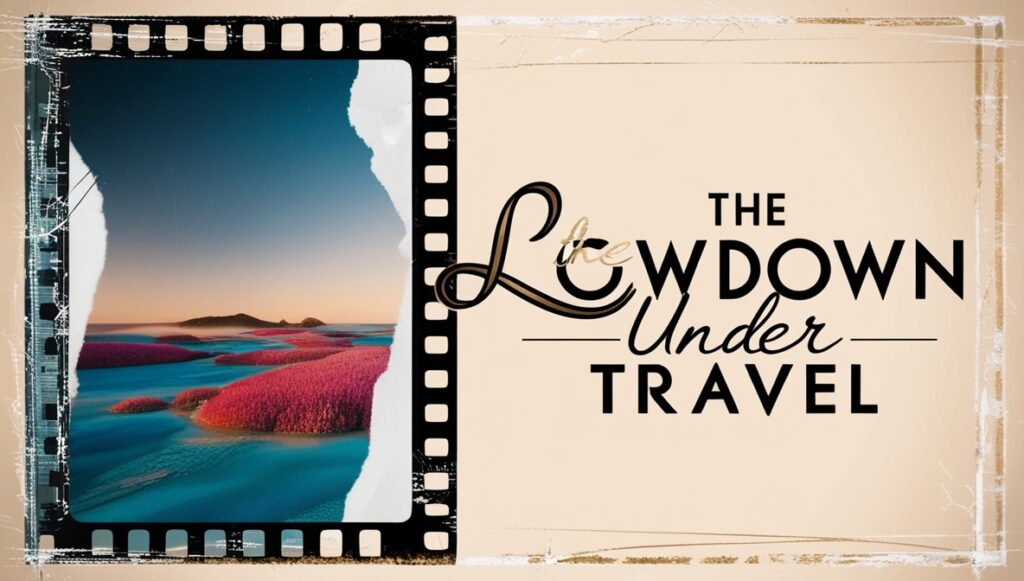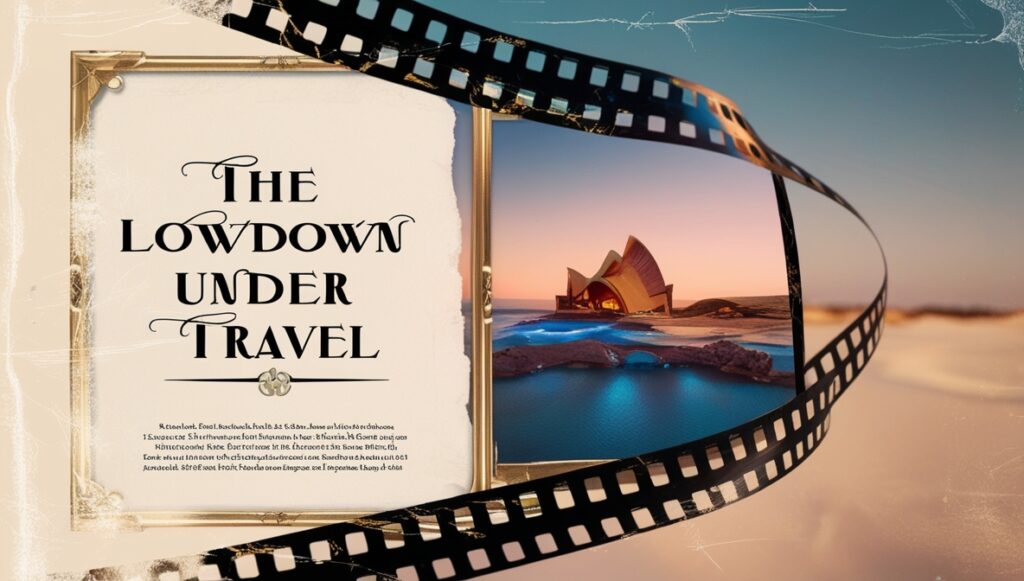Travel isn’t about ticking boxes. It’s about living somewhere else, even if only for a moment. This is the guide you didn’t know you needed—a raw, clever, and actually useful deep-dive into smarter, more soulful travel. Welcome to thelowdownunder travel mindset.
Think Ahead—But Don’t Plan Like a Control Freak
Booking your flight early can save you hundreds. No brainer. Planning a rough route? Smart. But planning every single second? That’ll suffocate the magic.
Just sketch the essentials—key stops, visa requirements, a few can’t-miss things. Then, let the rest unfold. Travel’s weird like that. The stuff you didn’t plan is often the stuff you never forget.
Someone once told me they planned a three-country blitz. Ended up stuck in Montenegro for a month because of a jazz festival and a girl named Lea. No regrets.
Loose Plans, Strong Backbone with TheLowdownUnder Travel
The best way to balance freedom and structure? Make sure your travel “skeleton” is solid. Bones like: when and where you’re flying in and out, high-demand bookings, and maybe a few anchor activities.
But leave the meat of your days open.
Use tools like Google My Maps, or even a messy notebook. And don’t be afraid to rip up the plan. Spontaneity is a feature, not a flaw.
Packing Like You’re Not Hauling a Body
Heavy bags are a curse. Especially when you’re racing to catch a bus with no suspension through backroads in Nicaragua. Be ruthless.
Most people only use 60% of what they pack. The other 40% is just… regret.
Here’s what actually matters:
- 3-4 versatile outfits
- 1 pair of solid walking shoes
- Quick-dry towel
- Power bank
- Small bottle of Dr. Bronner’s (cleans everything—clothes, skin, soul)
Keep it under 10kg. Your back will thank you. Your mood will improve. Your airline fees will vanish.
Know the Land Before You Land
Don’t be the traveler who shows up in Bangkok during Songkran with no clue what’s going on. Or wears shorts in a church in Armenia.
Context is king. Spend an hour doing some basic digging before you leave. You’ll save yourself embarrassment—and maybe a fine.
Key things to look up:
- Local customs and gestures (thumbs up is rude in some places)
- Language basics
- Scams to avoid
- Current events (protests, elections, etc.)
- How public transit works
Apps like Rome2Rio, Maps.me, and Google Translate are literal travel cheat codes. Use them.
Budget Like You’re Not Elon Musk with TheLowdownUnder Travel
Money stress is a travel buzzkill. The trick? Know what things should cost before you arrive.
Set a realistic daily budget based on the region. Leave a buffer for emergencies (or a spontaneous scuba dive, who knows?).
Sample Daily Budget (Latin America, moderate style):
| Category | Cost (USD) |
|---|---|
| Accommodation | $15–25 |
| Food | $10–15 |
| Local Transport | $3–5 |
| Activities | $10–20 |
| Extras | $5 |
| Total | $43–70/day |
Use apps like Trail Wallet or TravelSpend to track costs. Or just use your Notes app and brutal honesty.
Leave the Main Road. Get Lost a Little.

Every traveler says they want to avoid the crowds—but then follows the same Google Maps pins as everyone else. Want real discovery? You gotta work for it.
Go where the locals go. Take the road that doesn’t have a road. Learn to love awkward directions from old shopkeepers who draw maps in the air.
Benefits of going off-grid:
- Things are way cheaper
- People are more curious about you
- You get real, unfiltered culture
- You’ll feel like you earned the experience
To find these places:
- Use Instagram’s location tags in local language
- Join regional travel Facebook groups
- Ask expats, not just locals—they know what surprises foreigners
- Use the offline mode on MAPS.ME and just walk
Take the Bus. Take the Metro. Take the Damn Train.
Public transport is one of the best ways to understand a place. It’s where you’ll see morning routines, overhear daily gossip, and accidentally get off at the wrong stop.
Bonus: It’s usually dirt cheap.
Tips to make it smoother:
- Download local apps (like Moovit)
- Ask for change before you get on
- Try to avoid rush hours unless you enjoy human Tetris
- Keep a photo of your destination’s name in local script
Even if you screw up, you’re still exploring. Just with a better story.
Eat Everything. Not Just the Safe Stuff.
Food is culture. You want to taste the soul of a place? Start with your tongue.
Forget the hotel breakfast. Skip the overpriced foreign restaurant. Walk until you see smoke, a crowd, or someone stirring something in a giant pot.
Must-try bites around the world:
- Georgia: Khinkali (juicy dumplings of joy)
- Peru: Anticuchos (yes, grilled beef heart—don’t knock it)
- Thailand: Khao Soi in Chiang Mai
- Morocco: Fresh bread dipped in argan oil
Look for handwritten menus, plastic chairs, and old people eating there. That’s the gold.
Sleep Somewhere With a Soul
Hotels are safe. Hotels are boring.
Stay somewhere run by locals and you’ll get homemade breakfast, insider tips, and maybe even a ride to the bus station when you oversleep.
Where to find these gems:
- Booking.com: Filter for “homestays” or “guesthouses”
- Hostelworld: Not just for party kids anymore
- Couchsurfing (especially if you’re confident and curious)
- TrustedHousesitters or Workaway if you wanna exchange skills
You’ll spend less, learn more, and feel something you won’t forget.
Free Stuff is Often the Best Stuff
Some days you just don’t wanna spend money. Good news: you don’t have to.
There’s beauty and magic all over the place if you’re looking right.
Great free things to do almost anywhere:
- Self-guided walking tours
- Local markets (especially morning ones)
- Beaches, rivers, parks
- Cultural festivals, live music in squares
- People-watching over cheap coffee
Ask your hostel or a street vendor. Locals often know more than any app ever could.
Use Your Head. But Don’t Be Paranoid
Bad things can happen anywhere. But most places aren’t dangerous—they just need a little street smarts.
Be aware, not afraid.
Solid safety tips:
- Split your money: a decoy wallet is genius
- Use a VPN when using public Wi-Fi
- Trust your gut, always
- Don’t tell strangers your full plans
- Keep an emergency contact saved as “ICE” in your phone
And yes, always get travel insurance. Boring? Yup. Life-saving? Also yup.
Slow Down. No One’s Keeping Score
If your itinerary reads like a military op, you’re doing it wrong.
Slow travel isn’t about laziness. It’s about depth. About understanding a place beyond the tourist gloss.
Stay longer. Learn names. Take classes. Volunteer. Just exist in a place until it starts to feel familiar.
Ways to go slow:
- Rent a place for a few weeks
- Take cooking or language lessons
- Volunteer or work-trade
- Learn the public transport routes
Time is your biggest luxury. Use it like it matters.
Capture More Than Just Pretty Pictures
Sure, take photos. But try to capture the feeling too.
Write stuff down. Voice memo your thoughts. Sketch. Record the sounds of the street.
Your future self will thank you.
Creative ways to remember your trip:
- Keep a one-line-a-day journal
- Send postcards to yourself from each new city
- Interview a local or fellow traveler
- Collect weird things—tickets, labels, bottle caps
- Start a private photo blog just for your eyes
Travel isn’t about proving you were there. It’s about remembering who you were when you were.
Final Word from TheLowdownUnder Travel Brain
You don’t need to do it like everyone else. In fact, you shouldn’t.
Be real. Be curious. Ask dumb questions. Eat weird stuff. Trust strangers (sometimes). Lose your plans. Find something better.
That’s thelowdownunder travel way. Messy, soulful, alive.
If you take anything away from this guide, let it be this: Don’t just travel. Transform.
And when you do, send a postcard. Or at least a voice note.





